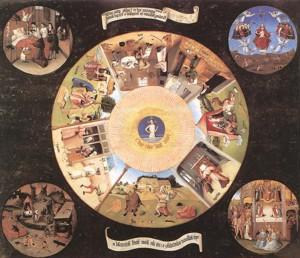 The Merriam-Webster dictionary online defines ambition as (a) an ardent desire for rank, fame, or power (b) desire to achieve a particular end. This is viewed as a virtue in much of our culture – certainly in academia. Ambition is also considered a virtue in the church. Perhaps most significantly in the view that “bigger is better.”
The Merriam-Webster dictionary online defines ambition as (a) an ardent desire for rank, fame, or power (b) desire to achieve a particular end. This is viewed as a virtue in much of our culture – certainly in academia. Ambition is also considered a virtue in the church. Perhaps most significantly in the view that “bigger is better.”
But is ambition a virtue? Should it be viewed as a virtue from a Christian perspective?
What role does ambition play in our church? What role should it play?
I’m skeptical. It seems to me that ambition is playing with fire. It is not inherently negative, in fact it is good to have goals and to work for those goals with perseverance. But ambition uses people, destroys relationships, and destroys community. Ambition is intimately coupled with envy, pride, and perhaps greed. We are fully embodied creatures and ambition feeds on our chemistry and biology and it shapes our natural responses, it is addictive.
I’ll go one step further. Ambition, although not always clearly recognized and acknowledged as such, wreaks havoc in the church. Sexual sin, despite the attention payed to it, is of less significance if we consider impact on community and pain caused. The difference in impact is primarily because we recognize sexual sin as sin – there are consequences. In contrast we often value and reward the result of ambition. We brush under the rug or rationalize away its impetus in envy and pride. This is a spiritual problem and a physical problem.
We are, I believe, fully embodied souls. Sin is a product of mind and will, but it is a fully embodied mind. I’ve posted on the embodied nature of sin before and borrow from those posts to start this discussion. This is background and necessary insight into the direction I would like to consider thinking about ambition. And yes, it is related to science.
Scientific developments have impact on our understanding of human behavior and human response. There was an article, Seven Deadly Sins, in the September 2009 issue of Discover Magazine that posed the question “Why does being bad feel so good?” and describes research being done these days to explore the science of sin. Scientists are using techniques such as functional magnetic resonance imaging (fMRI) and PET (positron-emission tomography) to map the active areas of the brain as a subject responds to certain stimuli.
Lust is a big one – Research into brain response connected with lust indicates that (in males at least) the response is all-encompassing. “All said, the most notable thing about lust is that it sets nearly the whole brain buzzing.“ The signals are unique, distinctive, unmistakable and uncontrollable. This isn’t surprising. We know that lust is a problem, we know that behavior can shape response, that there is a biological and chemical aspect that shapes not only the present, but the future. The biochemical response can be addicting and destructive. The lure of pornography is an excellent case in point. We could go on here, but this isn’t really the point of today’s post.
Envy is interesting – in a study of envy a number of volunteers were observed using fMRI while they read one of three scenarios – the key one described a student similar to the volunteer, but better in every respect. The conflict detecting regions of the brain fired and the response was similar to that for pain. This leads to the suggestion that envy is a kind of social pain. Later, when reading about this student’s downfall, the reward and pleasure regions of the volunteer’s brain fired. Not only this but the greater the pain in reading about the student’s success, the greater the reward in reading of the student’s downfall. The reward response is along the same line as that experienced from food – or sex. It feels good.
And now the queen of vices – Pride. Gregory the Great in commenting on Job noted (p. 489-490): “For when pride, the queen of sins, has fully possessed a conquered heart, she surrenders is immediately to seven principal sins, as if to some of her generals, to lay it waste. … For pride is the root of all evil, of which it is said, as Scripture bears witness; Pride is the beginning of all sin.” Thomas Aquinas in Summa Theologica dealt also with the question of pride as sin and concludes that is is indeed sin: “Now right reason requires that every man’s will should tend to that which is proportionate to him. Therefore it is evident that pride denotes something opposed to right reason, and this shows it to have the character of sin”
Does pride show response in brain scans? The science here is rather interesting.
For most of us, it takes less mental energy to puff ourselves up than to think critically about our own abilities. … volunteers who imagined themselves winning a prize or trouncing an opponent showed less activation in brain regions associated with introspection and self-conscious thought than people induced to feel negative emotions such as embarrassment. We accept positive feelings about ourselves readily, Takahashi says: “Compared with guilt and embarrassment, pride might be processed more automatically”. (p. 51)
In another experiment a part of the brain could be stimulated to turn off the protective influence of pride. When this happened “they saw themselves as they really were, without glossing over negative characteristics.” (p. 51)
Even more interesting, the experiments demonstrate that righteous humility, deliberate self depreciation, is but arrogance and pride in disguise. The brain activation is the same. “Both are forms of one-upsmanship. ‘They are in the same location and seem to serve the same purpose: putting oneself ahead in society.‘” (p. 51)
What does this mean? Self confidence, ambition, pride, envy – this is a slippery slope. It is insidious – affecting our very make-up inside out. We are wrong when we cast it “simply” as a battle of wills. And our capacity for denial, blame-shifting, and self-deception is also rooted in our make-up. It is interesting though, because studies also show that we can train our brains and influence response – especially true of sins of envy, wrath, and pride. Feeding ambition, with its corollaries of envy and pride, is like feeding lust. It changes our very being, our function, our chemistry, our brain paths. On the other hand intentional pursuit of virtue is also self reinforcing.
So why is it playing with fire? A look at the church in America over the last decade should make it clear. Mars Hill, Willow Creek, coverups in the Catholic Church, and many others if we dig a little. Ambition, pride, and the quest for power played a role in all of these. It is always wrapped in “righteousness” – doing God’s work, protecting his image, saving souls. The goal becomes influence and power hidden behind a veneer of righteous humility.
Thinking about it brings me to my knees. Lord, help me stay focused on the goal, the edification of the church and the kingdom of God. … And may they forget the channel, seeing only Him.
This reflection leads me though, to an idea that I would like to pose for consideration. Within the American evangelical church we view ambition as a virtue. We condone ambition, we reward ambition, we cultivate ambition, we admire ambition, we feed ambition. And this is a serious problem.
In fact, I think it is one of the biggest and most destructive temptations active in our church today. Ambition, accompanied by, and inextricably intertwined with, pride and envy.
What do you think?
What role does ambition play in our church? What role should it play?
How do we guard against pride and envy and stay focused on Christ?
If you wish to contact me directly you may do so at rjs4mail [at] att.net.
If interested you can subscribe to a full text feed of my posts at Musings on Science and Theology.
This is an edited and shortened re-post (but timely)















